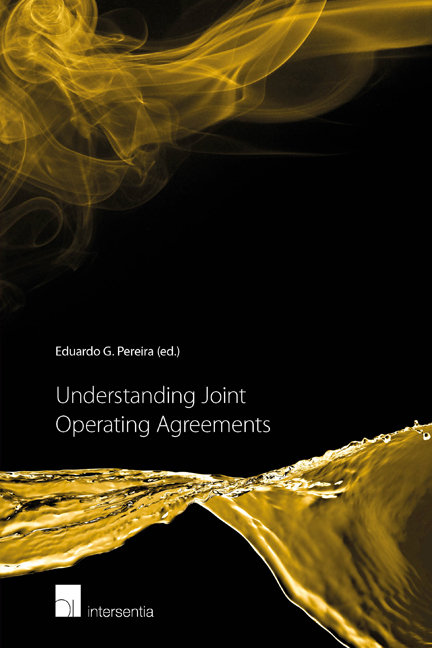Book contents
- Frontmatter
- Contents
- List of Abbreviations
- List of Authors
- Introduction
- PART I CONSIDERATIONS PRIOR TO ENTERING INTO A JOA
- PART II SETTING UP A JOA
- PART II.A GENERAL CONSIDERATIONS
- 9 The Scope of the JOA
- 10 Addressing Health, Safety and Environment Matters
- 11 Insurance: What Should Be Insured, Who Should Be Liable For It and to What Extent?
- 12 Transfer of Interest and Change of Control in JOAs
- 13 Governing Law and Dispute Resolution Clauses in JOAs
- 14 The Challenges of Implementing an Exclusive Operation
- PART II.B CONTROL OF OPERATIONS AND EXPENDITURES
11 - Insurance: What Should Be Insured, Who Should Be Liable For It and to What Extent?
from PART II.A - GENERAL CONSIDERATIONS
Published online by Cambridge University Press: 15 December 2017
- Frontmatter
- Contents
- List of Abbreviations
- List of Authors
- Introduction
- PART I CONSIDERATIONS PRIOR TO ENTERING INTO A JOA
- PART II SETTING UP A JOA
- PART II.A GENERAL CONSIDERATIONS
- 9 The Scope of the JOA
- 10 Addressing Health, Safety and Environment Matters
- 11 Insurance: What Should Be Insured, Who Should Be Liable For It and to What Extent?
- 12 Transfer of Interest and Change of Control in JOAs
- 13 Governing Law and Dispute Resolution Clauses in JOAs
- 14 The Challenges of Implementing an Exclusive Operation
- PART II.B CONTROL OF OPERATIONS AND EXPENDITURES
Summary
INTRODUCTION
The JOA is the private agreement which ‘ splits ‘ the joint and several liability imposed by the terms of the licence (as awarded by the relevant state) and regulates the relationship, obligations and rights between the joint venture (JV). A JOA will cover many aspects of the partners ‘ investment and is generally designed to last the lifetime of the investment through exploration to production and (in some examples) cessation of production. It addresses the parties ‘ rights, obligations and liabilities, how the JV is to be run and funded, the default mechanisms for failing to comply with various obligations, provisions for decision making, and specifies the duties and limitations of liabilities for the party which is responsible for the day-to-day running of the co-venture and petroleum operations namely, the operator. The operator is the party who usually enjoys the highest participating interest in the JV and oft en boasts a higher financial and technical standing compared to the non-operator parties. The high-risk, high-cost (but ultimately high-reward) environment in which oil and gas companies operate is the main reason why JVs are established and it allows these companies to share the high expenditures and uncertainties across a portfolio of investments around the world in order to maximise profits. JVs can take the form of a corporation, limited liability or company, although in the oil and gas industry JVs are usually unincorporated, which means that the JV does not have a distinct legal personality and therefore cannot be taxed, sued or sue in its own name.
The risks associated with oil and gas activities are vast and potentially catastrophic. Commonly cited risks include technical, geological, environmental and political risks, each set against the backdrop of the specific region in which operations are conducted and the world economy whose hunger for petroleum ultimately dictates whether the risk/reward off set was worth its price. As explained above, the JV structure permits oil and gas companies to share and thereby mitigate the risks. The skill and performance of the operator in conducting petroleum operations will play a significant role in the level of operational risk exposure.
- Type
- Chapter
- Information
- Understanding Joint Operating Agreements , pp. 191 - 206Publisher: IntersentiaPrint publication year: 2016



